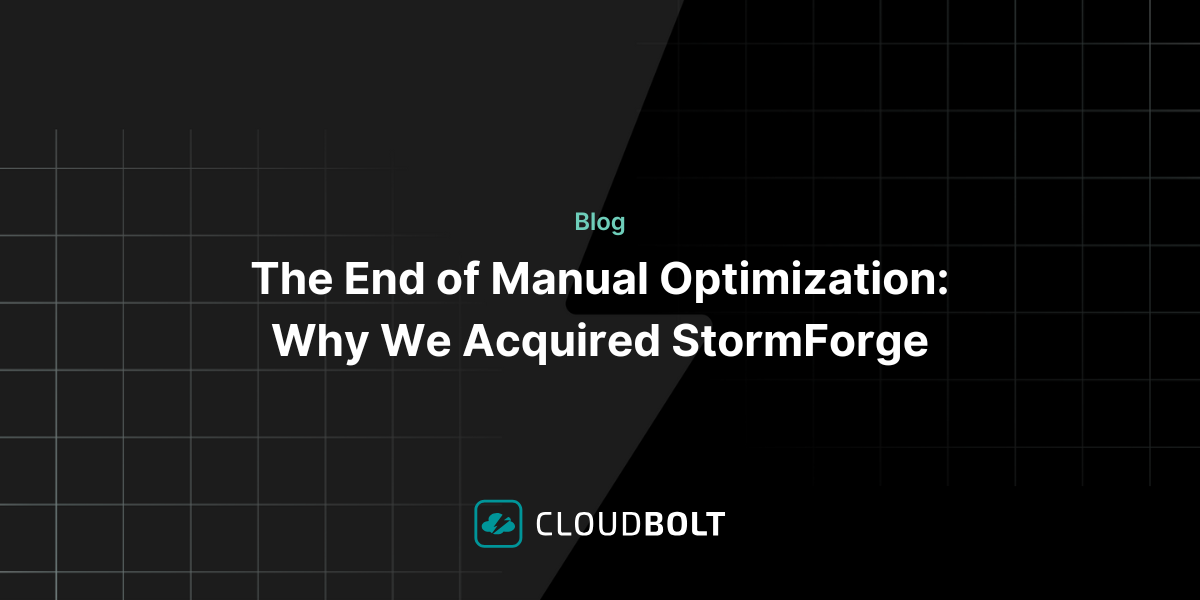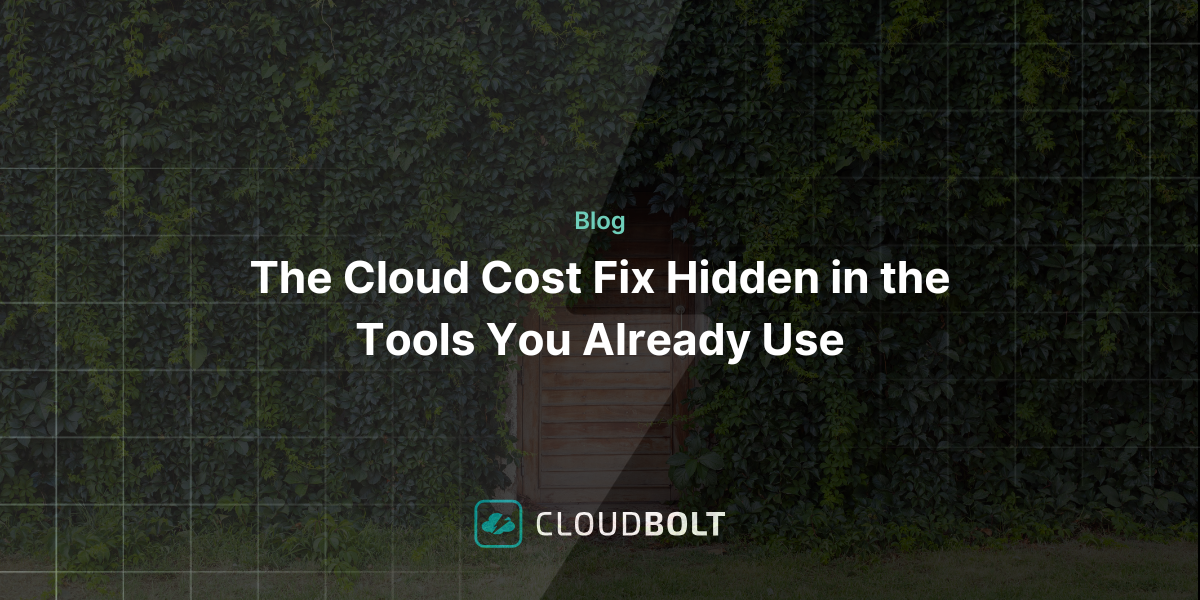A New Way To Manage Hybrid Cloud: CloudBolt’s Winter 2021 Release
CloudBolt is committed to delivering solutions that our customers need during their hybrid cloud and multi-cloud journeys. On the heels of our 2020 acquisitions of SovLabs and Kumolus, we’re excited to share that these products are coming together to meet our customers in their digital transformations.
We’re pleased to share several new features across our portfolio of cloud management and integration solutions to help customers accelerate and simplify their hybrid and multi-cloud journeys. Our January release provides enhancements to support greater collaboration with DevOps teams, richer integrations for Terraform and VMware vRealize Automation (vRA), as well as improved cost management capabilities for both public and private cloud workloads.
New Integration Capabilities with Ansible Tower and Support for Scripting-as-a-Service
The release of OneFuse 1.2, the only codeless integration platform for infrastructure automation, introduces a new module for integration support with Ansible Tower. This integration will enable admins to create their own Ansible-powered services that other teams, tools and scripts can consume via platform providers or API without requiring direct access or understanding of Ansible Tower.
With this groundbreaking new feature, enterprises can:
- Create policy-based services for Ansible Tower to provide full lifecycle capabilities, including provisioning, de–provisioning, and day-2 management for easier integrations with other automation tools (vRA, Terraform, CloudBolt, ServiceNow, etc.).
- Provide governance through guardrails for lifecycle use cases using the OneFuse template engine, which allows OneFuse administrators to use variables to deliver dynamic outcomes.
- Centralize visibility into provisioning requests using the OneFuse Ansible module and track job execution, requestors, and outcomes. Thus, it becomes one single place to track the complete progress.
Our OneFuse 1.2 release also includes the introduction of the Scripting Module, which allows customers to create scripting-as-a-service, fully inventoried and reusable across automation platforms and tools. With this feature users can:
- Easily turn one-off scripts into reusable services that can be consumed by automation tools or service catalogs. We like to think of this as: “write once and use it everywhere.”
- Achieve centralized management and visibility into script deployments and outcomes along with full audit capabilities.
- Utilize role-based access control to ensure scripts are executed by the right teams and tools. This helps IT maintain control on their resources.
- Execute scripts without a third-party agent – the OneFuse Scripting Module is agentless and lightweight.
- Trace and identify any changes made to systems (typically seen as part of day-2 operations) where the original content of a target system has been modified by a script.
The types of scripts users can include but are not limited to:
- Return the timestamp by running date on a target machine
- Run yum install mariadb on CREATE and yum remove mariadb on DELETE to install/uninstall mariadb.
- Modify users and groups on a target VM
- Enumerate running services on a Windows VM
- Patch a Linux VM by running yum update -y or apt-get upgrade
- Any Linux (Bash) or Windows (PowerShell) script
Cost optimization capabilities for VMware vCenter and Azure environments through Kumolus
We announced the acquisition of Kumolus, an award-winning cloud cost management platform, in Q3 last year and we’re excited that acquisition is now complete. This Software-as-a-Service (SaaS) platform supports cost management, optimization and compliance for public clouds such as Amazon Web Services (AWS) and Microsoft Azure.
Through our winter release, Kumolus now supports VMware vCenter. This support was requested by our customers who want to manage their on-premises environment through the powerful Kumolus platform. They asked for an easier way to optimize resources managed through vCenter and the same granular visibility they have for AWS and Azure. Through this support, customers can now:
- Gain the same level of visibility into their vCenter environments. This is through powerful Kumolus reports and dashboards.
- Optimize on-premises better through our accurate rightsizing recommendations. These recommendations help customers identify idle resources that eat into their budget.
- Schedule checks across the environment and get alerted when certain conditions are met, for instance, when CPU usage drops below 10% for a week.
We’ve also added more optimization capabilities within Kumolus for the Azure environment. For customers invested in Azure looking to find opportunities to automatically save money, this will be a game–changer. Many times, these services are overlooked through no fault of the user. Now, based on your usage, Kumolus finds you saving opportunities for the following services in addition to our current support:
- Load balancers
- Unused snapshots
- Public IPs
- Idle disks
You can also customize reports and dashboards within Kumolus. Thus, if you are a CFO (or CISO, CFO, cloud admin) and you’re interested in seeing certain data points you can do that very easily. Thus, all your important KPIs can be found on a single dashboard. Also, you can create favorite reports and check the information by user, function, services, etc., and save all the reports under your favorites tab.
If you’re interested in trending information it’s simple to compare information, such as resource usage by a user, over certain days, months, or years. You can define the period for that comparison to get a direct answer to your questions.
Finally, Kumolus is now pre-integrated with Slack for alerts and notifications. Thus, when certain user–defined conditions are met (CPU usage, compliance deviations, etc.) a certain user or channel gets notified immediately in Slack. This helps you monitor and manage your environment better by reducing your reaction time (more integrations for alerting coming soon).
Richer Terraform integration for DevOps in CloudBolt 9.4.4
In our 9.4.4 release, CloudBolt Cloud Management Platform has enhanced Terraform support by adding new Terraform Orchestration Actions. These hooks enable CloudBolt administrators to customize Terraform’s execution via user defined CloudBolt Plugin code. These hooks can help:
- Modify and manage Terraform resources
- Introspect generated Terraform State
- Configure credentials for a Terraform Provider
- Send Slack messages on success of provisioning, etc.
- Perform any other organization-specific workflow tasks
These actions provide tools for admins to customize Terraform integration and avoid Professional Services engagements.
To see all these features in action, schedule a demo today.
Related Blogs

How I Rethought Cloud Budgeting—And What Finance Leaders Need to Know
If you’re a finance leader trying to bring more structure and strategy to cloud budgeting, you’re not alone. While most…

